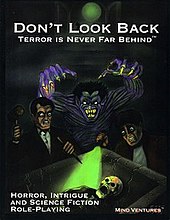
The Generic Universal RolePlaying System, or GURPS, is a tabletop role-playing game system designed to allow for play in any game setting. It was created by Steve Jackson Games and first published in 1986 at a time when most such systems were story- or genre-specific.
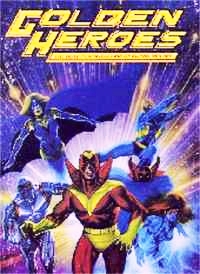
Golden Heroes is a British superhero role-playing game that was originally written and published on an amateur basis in 1981, and then republished in a more complete and professional form by Games Workshop in 1984.
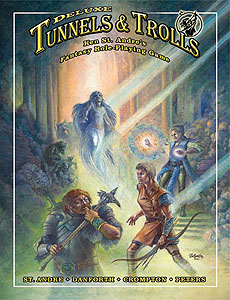
Tunnels & Trolls is a fantasy role-playing game designed by Ken St. Andre and first published in 1975 by Flying Buffalo. The second modern role-playing game published, it was written by Ken St. Andre to be a more accessible alternative to Dungeons & Dragons and is suitable for solitaire, group, and play-by-mail gameplay.
Rolemaster is an extremely complex fantasy tabletop role-playing game published by Iron Crown Enterprises in 1980. The game system has undergone several revisions and editions since then.

Champions is a role-playing game published by Hero Games designed to simulate a superhero comic book world. It was originally created by George MacDonald and Steve Peterson in collaboration with Rob Bell, Bruce Harlick and Ray Greer. The latest edition of the game uses the sixth edition of the Hero System, as revised by Steve Long, and was written by Aaron Allston. It was released in early 2010.

Castle Falkenstein is a steampunk-themed fantasy role-playing game (RPG) designed by Mike Pondsmith and originally published by R. Talsorian Games in 1994. The game is named for a legendary unbuilt castle in the Bavarian Alps. Players play the roles of gallant adventurers who take on quests of intrigue and derring-do in the spirit of Victorian adventures such as The Prisoner of Zenda.

Over the Edge is a surreal role-playing game of secrets and conspiracies, taking place on the mysterious Island of Al Amarja. It was created by Jonathan Tweet with Robin Laws, and published by Atlas Games. Over The Edge departed from the model of predefined character attributes and skills, in favour of player-chosen traits; and was among the first to be based on the dice pool, where the number of dice rolled, rather than how they are interpreted, is determined by the characters' abilities.

Feng Shui is a martial arts-themed role-playing game, designed by Robin Laws, published first by Daedalus Entertainment and now by Atlas Games. The game shares its setting with the collectible card game Shadowfist. The system is simple, with most detail being in the game's combat system. Combat is made to flow quickly, moving from one action scene to another very quickly. It was inspired and based on Hong Kong style action movies. The characters begin at a high level of skill, as appropriate for protagonists in the source films.

The Palladium Fantasy Role-Playing Game is a fantasy role-playing game published by Palladium Books in 1983.
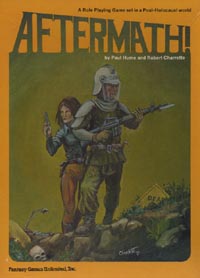
Aftermath! is a role-playing game created by Paul Hume and Robert Charette and published in 1981 by Fantasy Games Unlimited.

James Bond 007: Role-Playing In Her Majesty's Secret Service is a spy fiction tabletop role-playing game based on the James Bond books and films. It is designed by Gerard Christopher Klug and was published by Victory Games, a subsidiary of Avalon Hill. The game and its supplements were published from 1983 until 1987, when the license lapsed. At its time of publication, it was the most popular espionage role-playing game.

Ghostbusters is a comedy role-playing game published by West End Games (WEG) in 1986 that is based on the 1984 film Ghostbusters.

Conspiracy X is a role-playing game (RPG) originally released by New Millennium Entertainment in 1996, and since revised and released by several publishers including Steve Jackson Games and Eden Studios, Inc. In all versions, the setting posits that aliens are insiduously taking over the world, reminiscent of The X-Files.
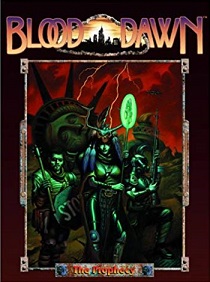
Blood Dawn is a cyberpunk role-playing game designed by Lawrence R. Sims and first published by Optimus Design Systems in 1996.
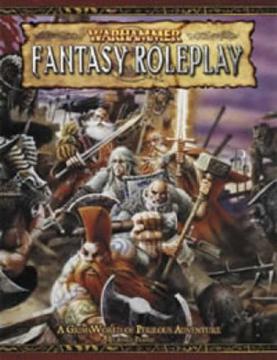
Warhammer Fantasy Roleplay or Warhammer Fantasy Role-Play is a role-playing game set in the Warhammer Fantasy setting, published by Games Workshop or its licensees.

Stormbringer is a fantasy tabletop role-playing game published under license by Chaosium. Based on the Elric of Melniboné books by Michael Moorcock, the game takes its name from Elric's sword, Stormbringer. The rules are based on Chaosium's percentile-dice-based Basic Role-Playing system.

Judge Dredd: The Role-Playing Game is a science fiction role-playing game published by Games Workshop in 1985. A second edition was published in 1989.

Dream Park: The Roleplaying Game is a role-playing game published by R. Talsorian Games in 1992. It was designed by Mike Pondsmith and was based on the 1981 novel Dream Park, which is itself about a live-action role-playing game amusement park. The player characters take on the roles of the players in this holographic game, simultaneously playing both the character and the character's alternate persona.

Bubblegum Crisis is a near-future cyberpunk role-playing game published by R. Talsorian Games in 1996 that is based on the anime television series Bubblegum Crisis.

Aliens Adventure Game is a combat-oriented role-playing game published by Leading Edge Games in 1991.
